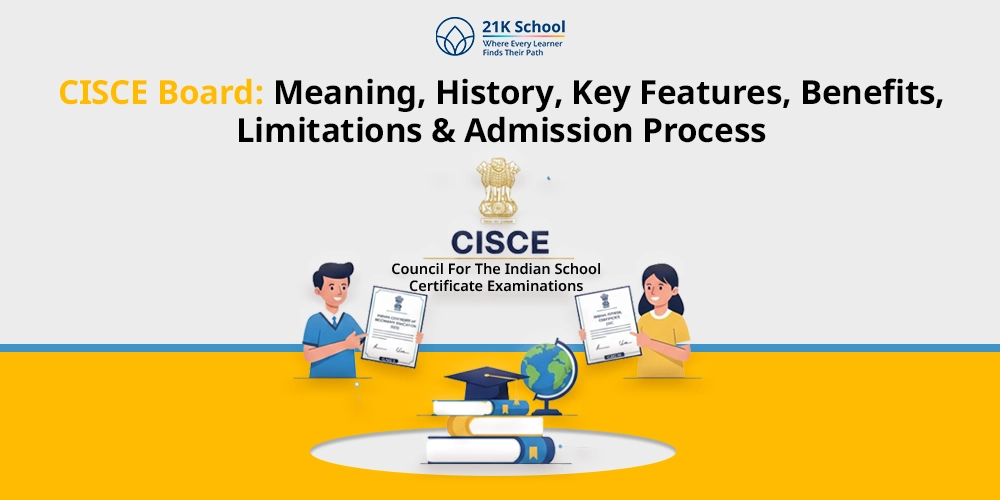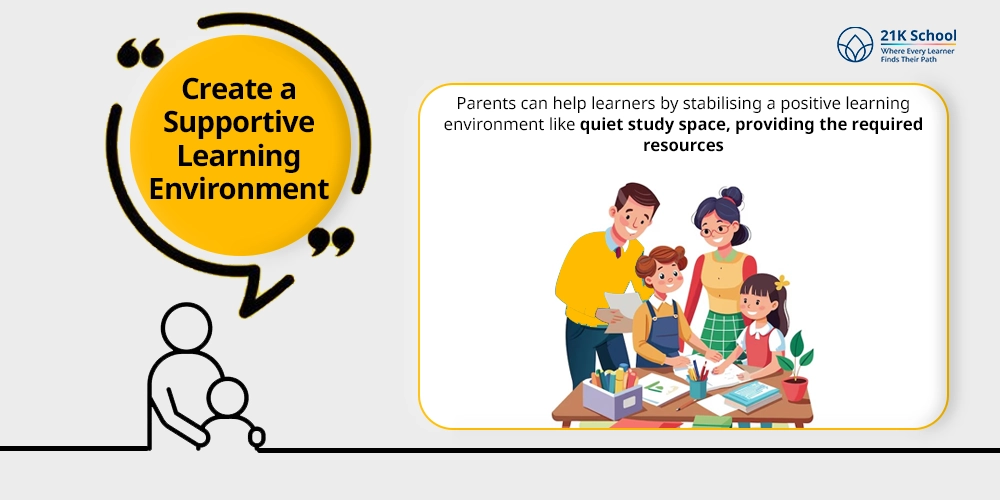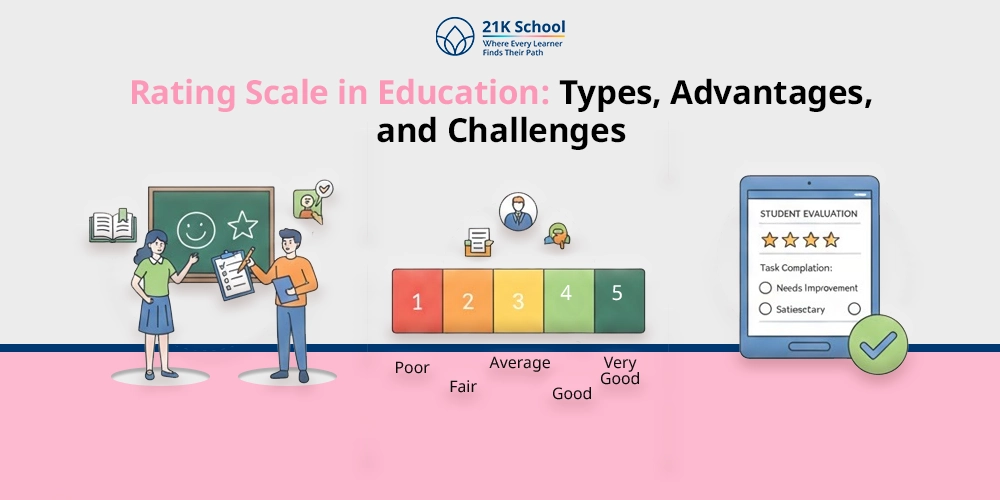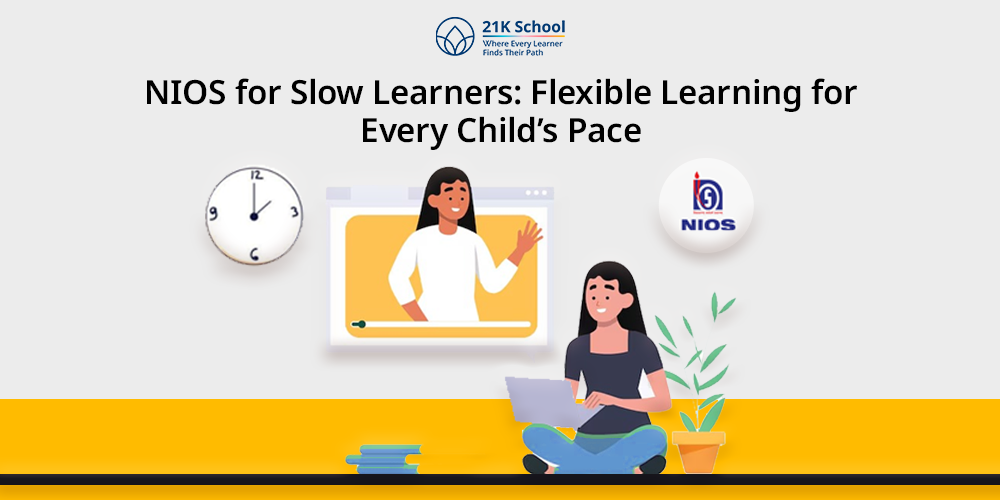
Do you know along with normal candidates, NIOS also provides opportunities to slow learners.
The National Institute of Open Schooling (NIOS) provides educational opportunities to slow learners. NIOS provides open access to education to every individual and promotes inclusive education .
NIOS for slow learners denotes the students who have physical challenges or find difficulties in the learning process. This gives opportunity to students who want to continue their education without any hindrances or barriers.
NIOS offers flexible learning opportunities to every student, which allows them to study at their own learning pace and convenience.
The emphasis on practical knowledge and skills, and the curriculum’s adaptation to make it more approachable, allow slow learners to interact with the content in a way that best fits their learning styles .
Slow learners or students who have physical disabilities can appear for the examination with facilities provided by NIOS.
Contents
What is NIOS for Slow Learners?
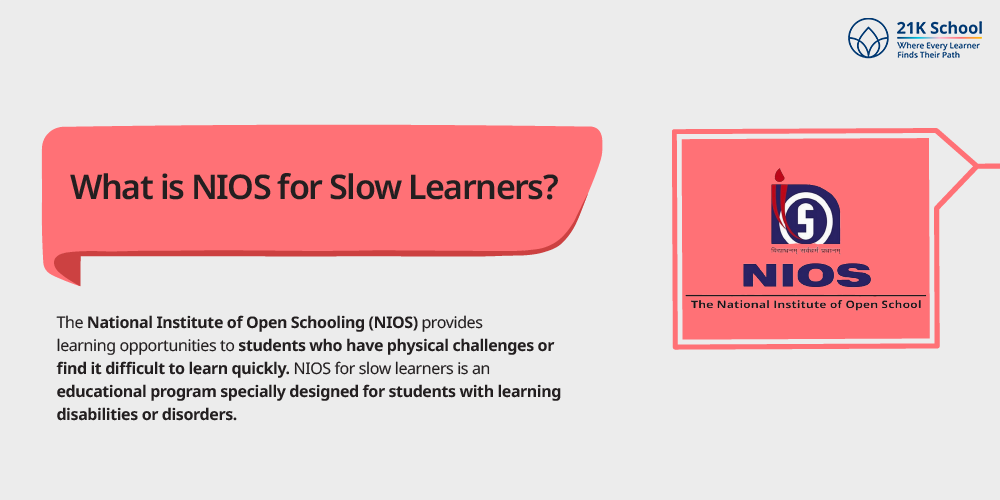
The National Institute of Open Schooling (NIOS) provides learning opportunities to students who have physical challenges or find it difficult to learn quickly. NIOS for slow learners is an educational program specially designed for students with learning disabilities or disorders.
NIOS provides open and distance education , which has the potential to alleviate the stress associated with a traditional classroom by providing students with flexible and self-paced learning options.
NIOS provides provisions to slow learners such as extra time, amanuensis, special permission, etc. This helps children with learning disabilities to appear for the examination without any challenges.
NIOS offers multiple subjects, enabling students to choose any subjects they want. Through the NIOS exam, slow learners can pass their secondary or senior secondary examination as per their convenience and flexibility.
Why NIOS is a Great Option for Slow Learners?
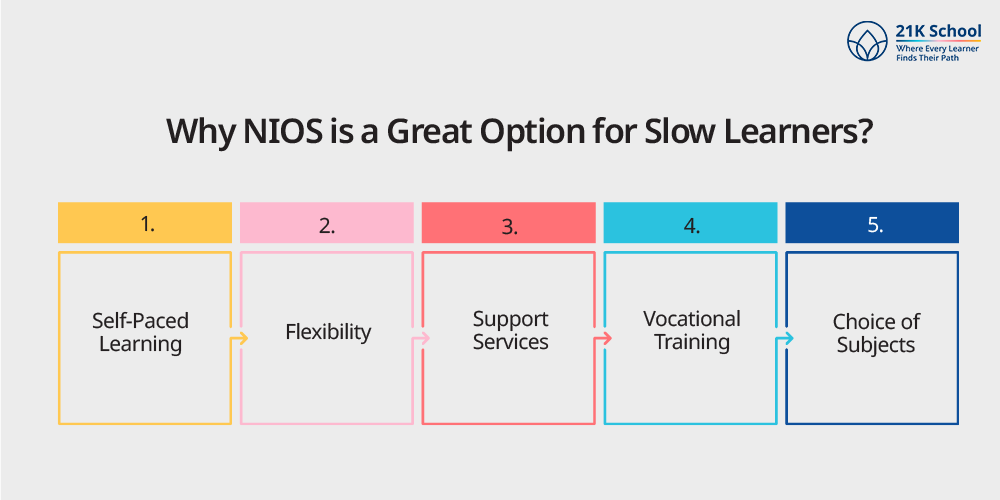
NIOS provides flexible and personalised education enabling students to participate in the teaching and learning process as per their comfortability.
NIOS provides special provisions to children with learning disabilities, enabling them to continue their education without any hindrances. Here is why NIOS is a great option for slow learners.
1. Self-Paced Learning
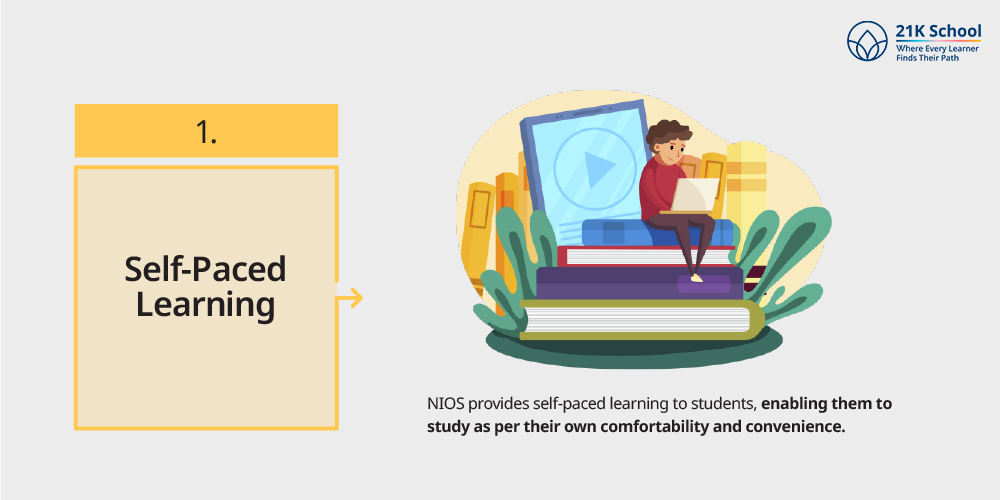
NIOS provides self-paced learning to students, enabling them to study as per their own comfortability and convenience.
Self-paced learning enables students to participate in the teaching and learning process and gives them exams according to their comfortability. The extra time allows students to focus on their weak subjects and enhance their learning outcomes.
2. Flexibility
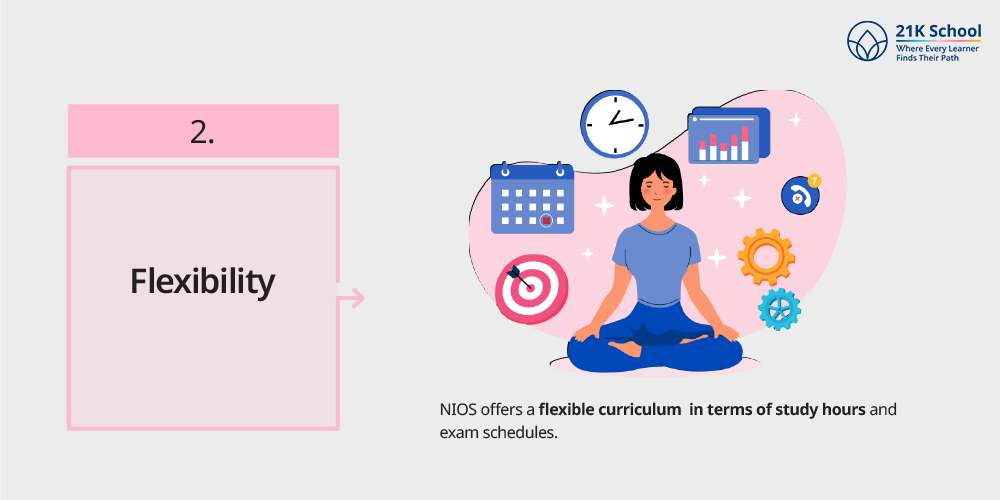
NIOS offers a flexible curriculum in terms of study hours and exam schedules. This enables students to balance their academic objectives with their personal commitments; this flexibility aids students in managing their learning process.
The flexible nature of NIOS enables slow learners to study at their own learning speed, making education and exams more efficient.
3. Support Services
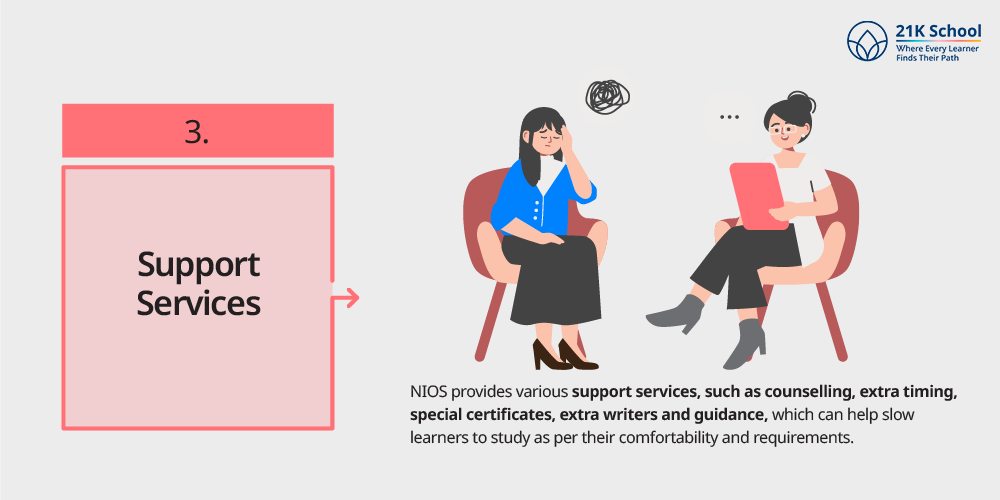
NIOS provides various support services, such as counselling, extra timing, special certificates, extra writers and guidance, which can help slow learners to study as per their comfortability and requirements.
These resources ensure that students receive the assistance they need to succeed in their educational process and future preparations.
4. Vocational Training
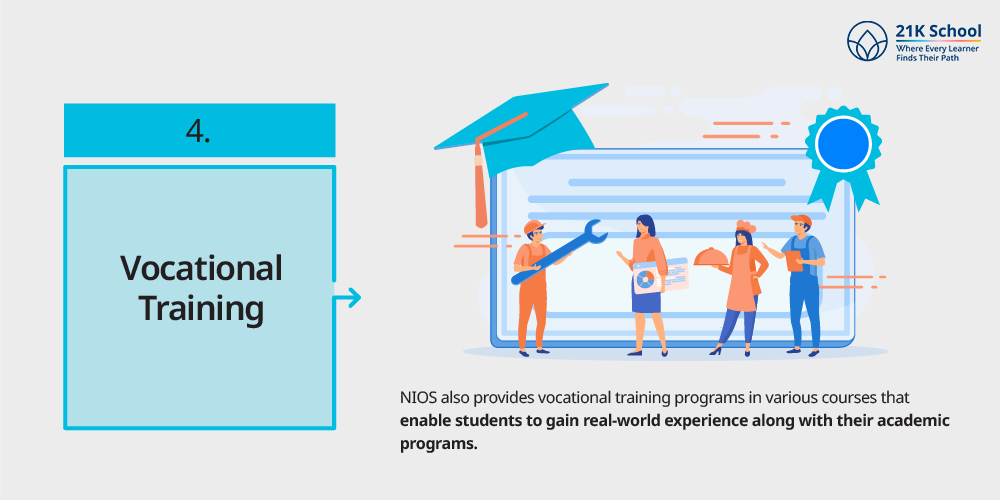
NIOS also provides vocational training programs in various courses that enable students to gain real-world experience along with their academic programs. The main purpose of vocational education is to make slow learners independent and provide them with skill development, which boosts learners confidence and chances of employability.
5. Choice of Subjects
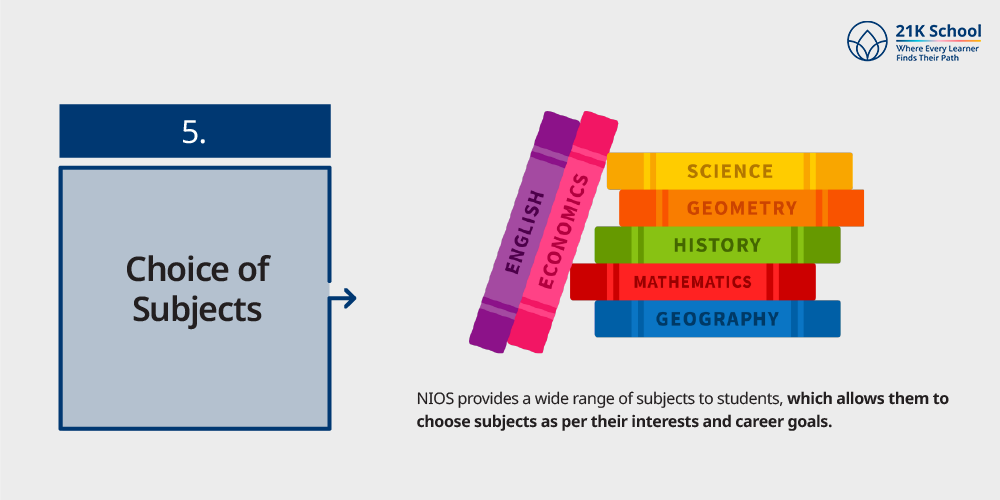
NIOS provides a wide range of subjects to students, which allows them to choose subjects as per their interests and career goals. NIOS offers more than 31 subjects, including vocational and languages.
Explore how many subjects are compulsory in nios 12th .
This autonomy provides students to feel more in control of their education which promotes greater engagement and creates a more positive learning environment .
Key Features of NIOS That Help Slow Learners
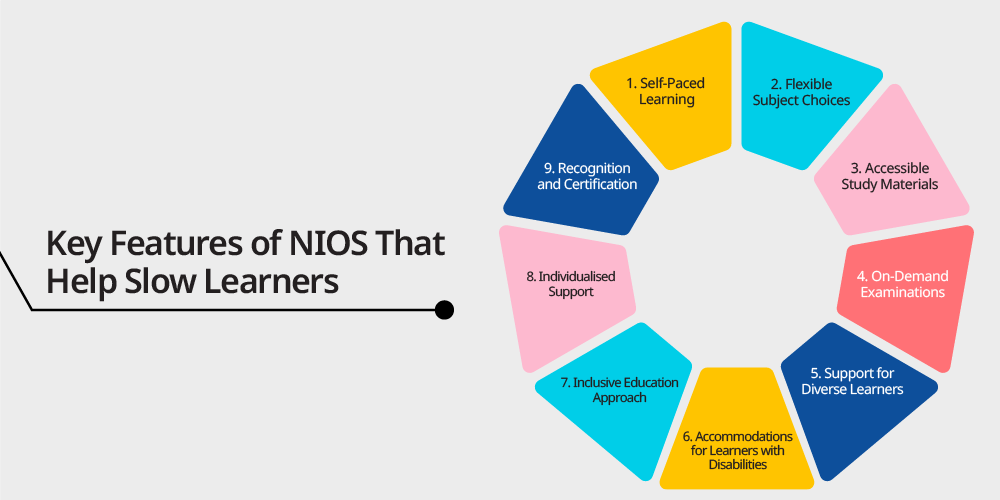
NIOS offers various features that allow students to complete their education without any hindrances.
Slow learners who find it difficult to maintain the speed and learning style with other peers can benefit from NIOS education . Here are the key features of NIOS that help slow learners.
1. Self-Paced Learning
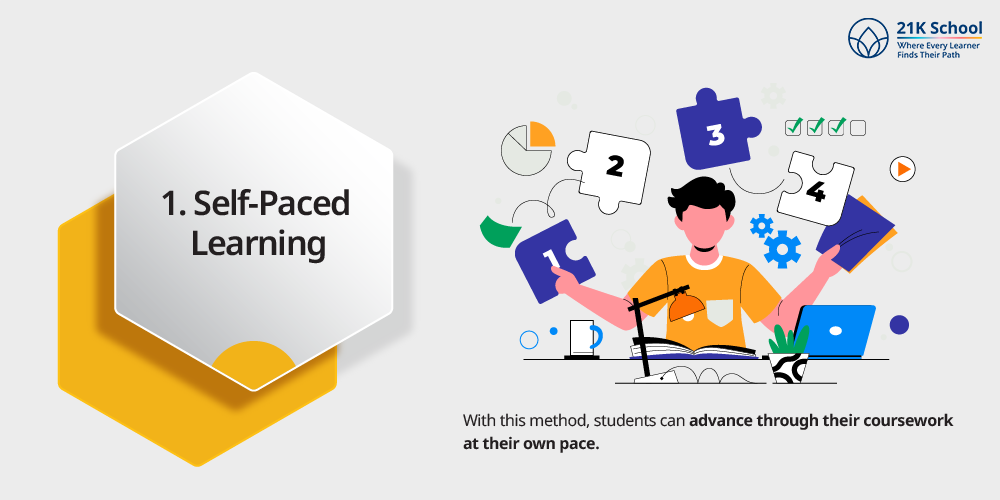
The self-paced learning approach used by NIOS is especially advantageous for slow learners. With this method, students can advance through their coursework at their own pace.
Instead of following a strict schedule like traditional educational systems do, NIOS allows students to devote more time to difficult subjects or ideas.
2. Flexible Subject Choices
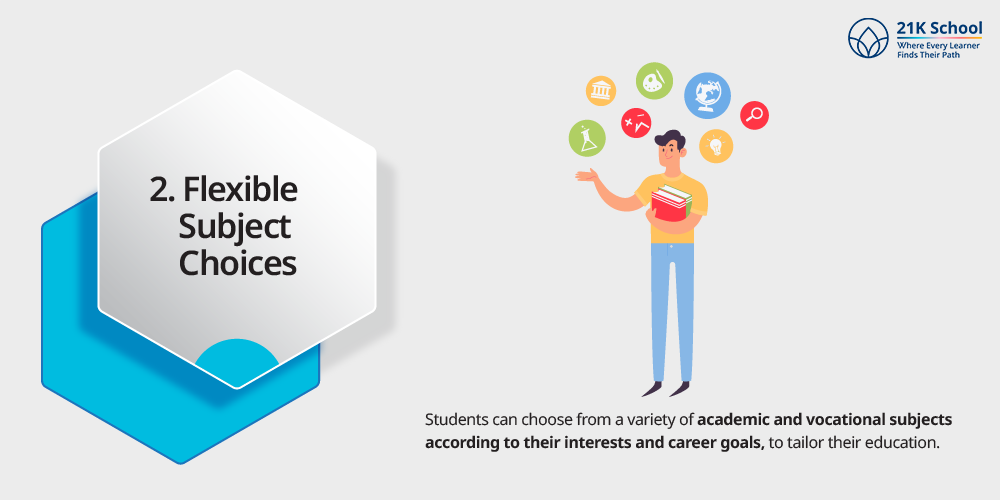
One of the most beneficial features of NIOS is that it offers a wide range of subjects. Students can choose from a variety of academic and vocational subjects according to their interests and career goals, to tailor their education.
This adaptability is crucial for slow learners because it enables them to engage with topics they are passionate about, which can increase their motivation and enthusiasm for learning.
3. Accessible Study Materials
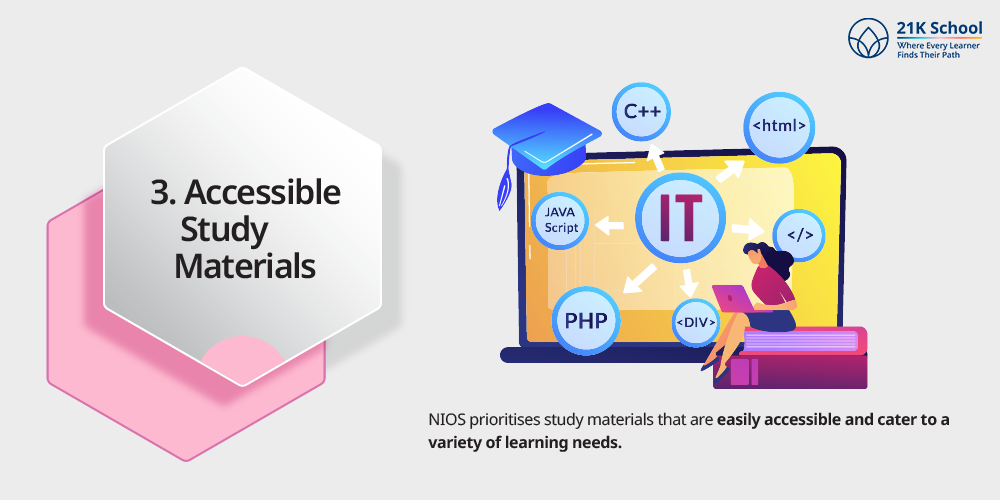
NIOS prioritises study materials that are easily accessible and cater to a variety of learning needs. This diversity enables all students, including those with visual impairments or learning disabilities to successfully access the curriculum.
Additionally, interactive elements that facilitate comprehension are incorporated into the materials to make them engaging and user-friendly.
4. On-Demand Examinations
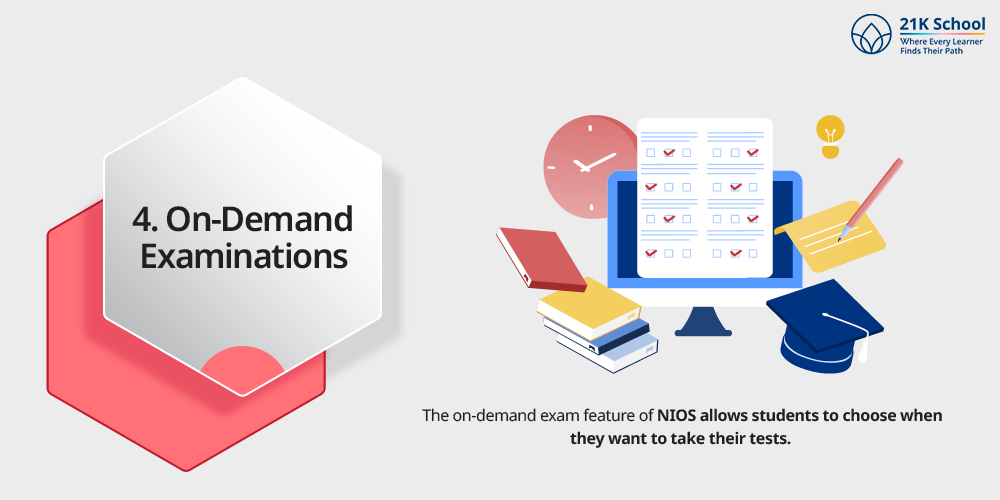
The on-demand exam feature of NIOS allows students to choose when they want to take their tests. This flexibility is beneficial for slow learners in particular because it eases the stress and anxiety associated with a scheduled test and study routine .
Students can organise their schedules and select a time when they feel most at ease and ready to take their examination.
5. Support for Diverse Learners
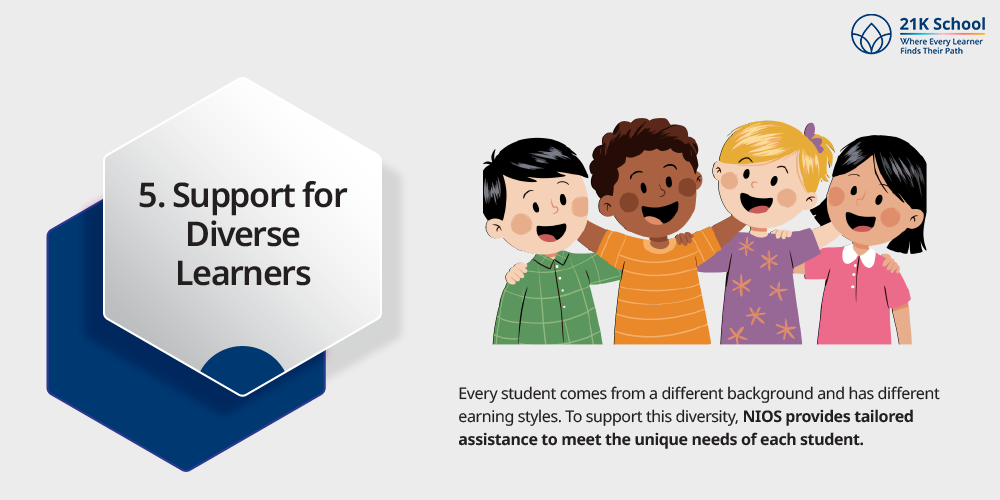
Every student comes from a different background and has different learning styles. To support this diversity, NIOS provides tailored assistance to meet the unique needs of each student.
In order to help students navigate their academic journey and ensure they receive the support they require to succeed, NIOS also offers guidance and counselling services.
6. Accommodations for Learners with Disabilities
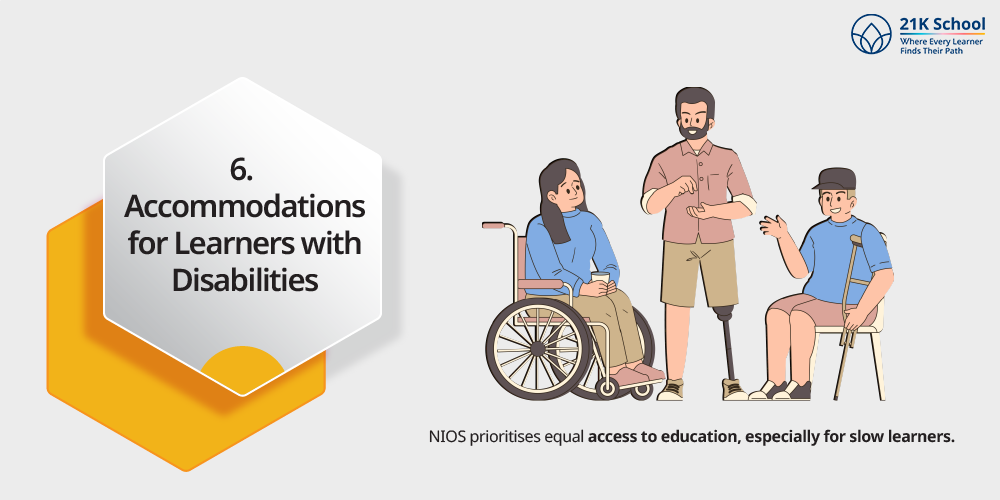
NIOS prioritises equal access to education, especially for slow learners. Additional time for tests, assistive technology and access to specialised materials are some of the specific accommodations that the NIOS provides to students with learning disabilities.
Giving students equal opportunities to showcase their skills and knowledge is the goal of these methods of learning.
7. Inclusive Education Approach
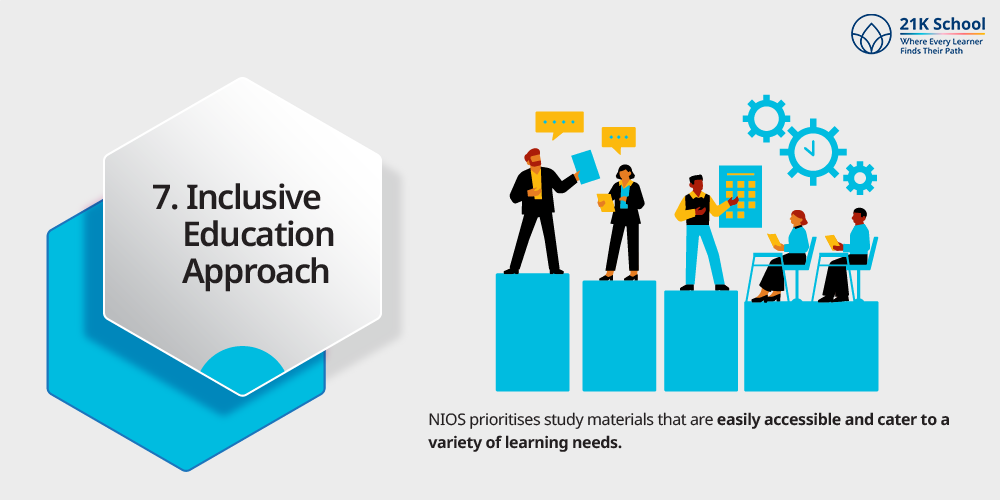
The NIOS promotes an inclusive educational framework that encourages collaboration and communication among all students, including those with disabilities and special needs.
This approach fosters a sense of belonging and community by fostering peer-to-peer learning and the growth of social skills in a supportive environment.
NIOS encourages collaboration skills and focuses on inclusivity and helping to break down barriers and stereotypes.
8. Individualised Support
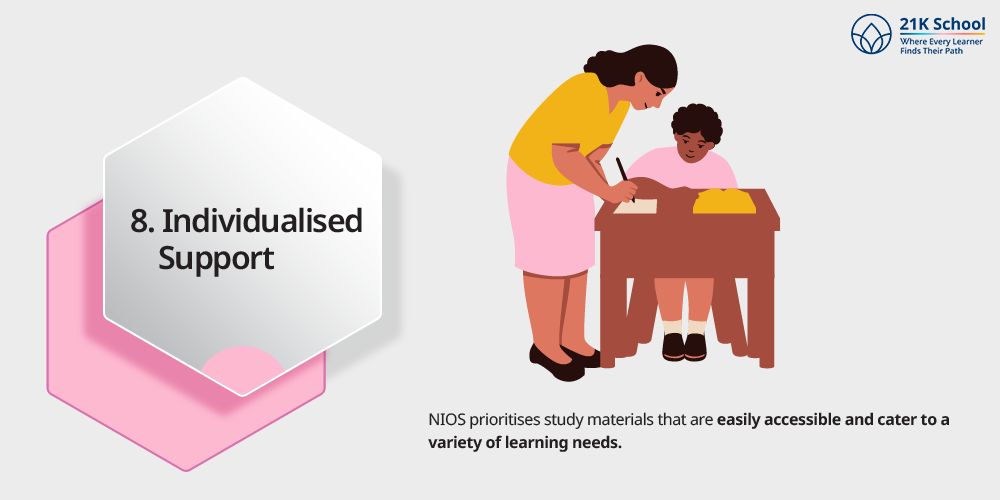
Every student has unique needs and goals, so NIOS provides specialised support to help them along their academic paths.
Examples of this assistance could include academic counselling, specialised tutoring and mentorship tailored to the particular needs of slow learners. Teachers work closely with students to identify their areas of strength and growth.
9. Recognition and Certification
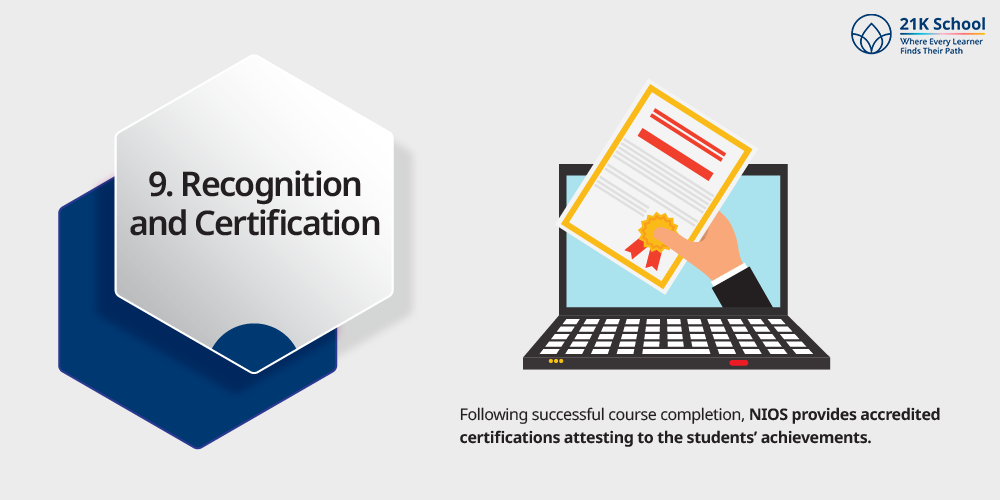
Following successful course completion, NIOS provides accredited certifications attesting to the students’ achievements. These certifications are essential for slow learners because they serve as an official recognition of their diligence and hard work.
Having a recognised degree can boost students’ self-esteem and drive by giving them access to jobs and further education.
Provisions for NIOS for Slow Learners
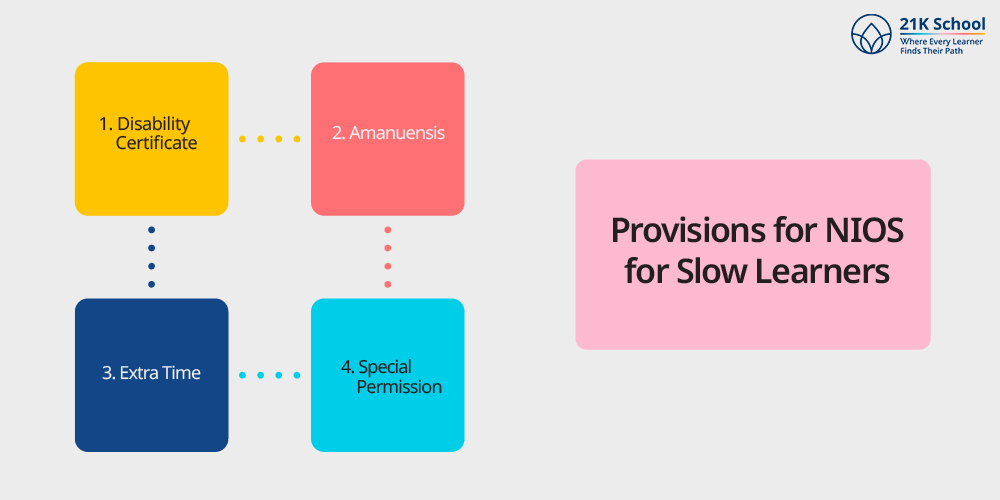
NIOS provides some provision to slow learners, which enables them to appear for the examination without any barriers.
These provisions are only applicable to students with learning disabilities or who have problems. These provisions include some facilities or services provided during exams or
1. Disability Certificate
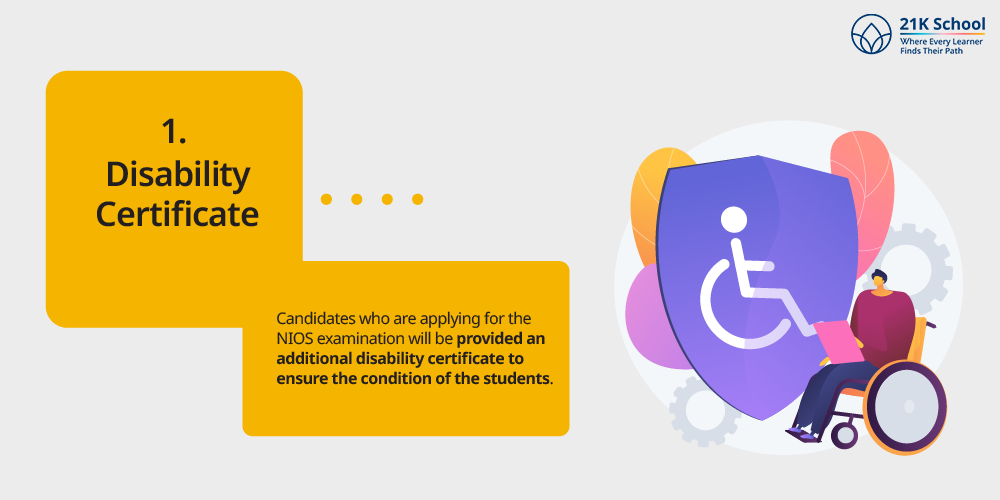
Candidates who are applying for the NIOS examination will be provided an additional disability certificate to ensure the condition of the students.
However, students who are applying for the disabled quota need to upload a disability certificate approved by the hospital or medical centre.
The disability certificate ensures the condition of the children, through which they will be provided special benefits and their needs.
2. Amanuensis
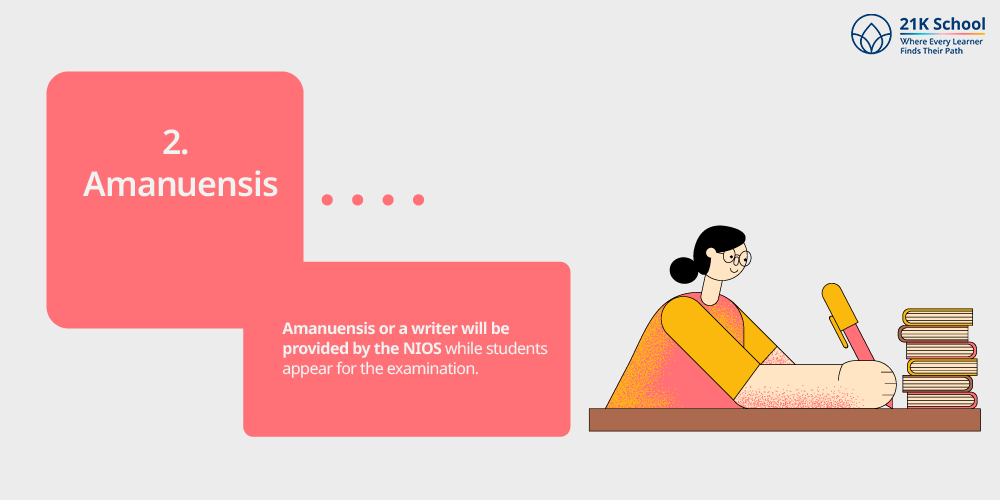
Amanuensis or a writer will be provided by the NIOS while students appear for the examination. Amanuensis will write down the answers on behalf of the student with their assistance.
This method is especially beneficial for slow learners who may struggle to write quickly or who have physical limitations. Since it allows them to express their knowledge without being limited by their writing abilities.
3. Extra Time
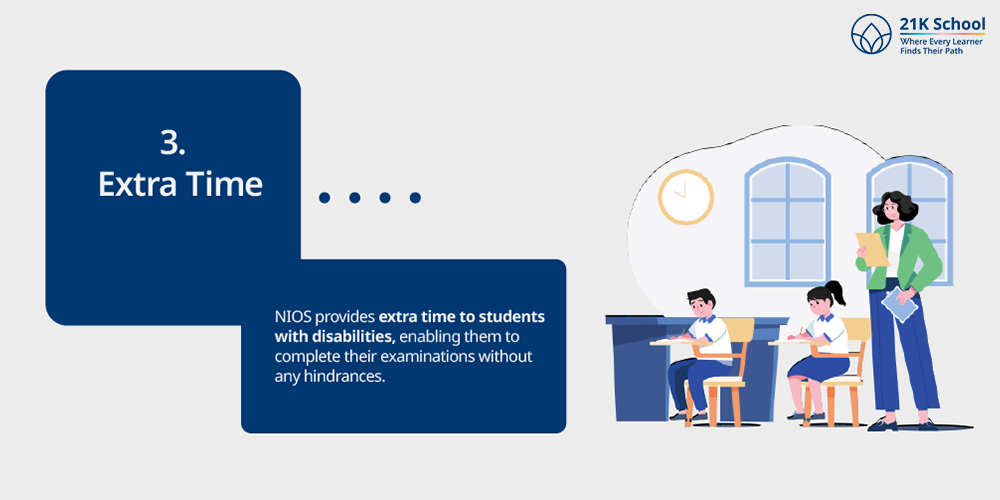
NIOS provides extra time to students with disabilities, enabling them to complete their examinations without any hindrances. Slow learners don’t have adequate speed to meet the time limit, and due to undue pressure, they will find it tough to write the exam.
For such students, NIOS allocates extra time, enabling them to write at their own speed and accuracy. This method reduces exam stress and promotes confidence among such children.
4. Special Permission
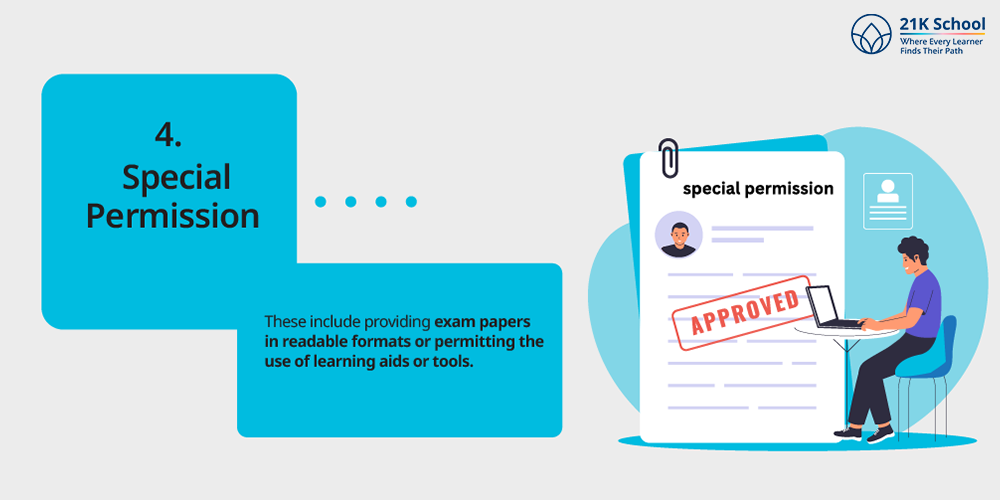
NIOS also offers special permission to slow learners to prepare for exams. These include providing exam papers in readable formats or permitting the use of learning aids or tools.
The main aim of these accommodations is to provide every student with the opportunity to succeed and appear for the examination without any challenges.
How to Enrol in NIOS for Your Child?
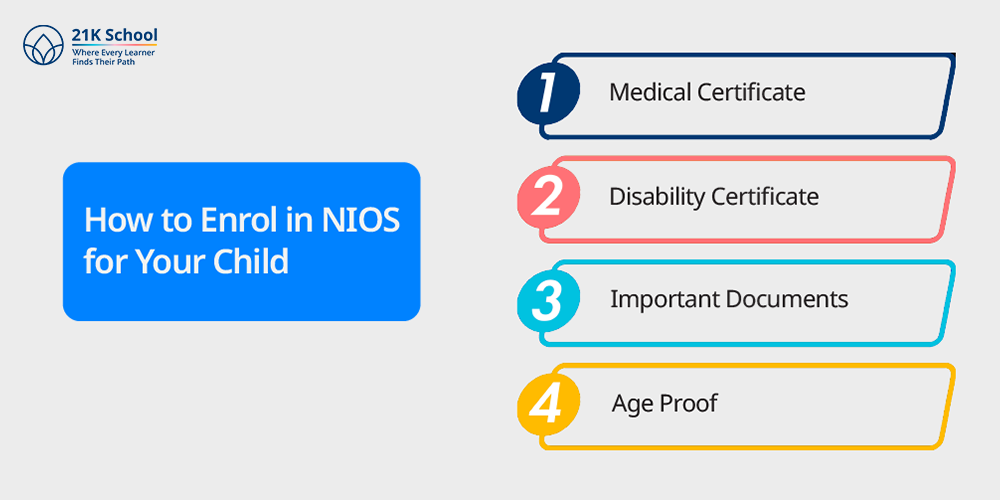
Candidates who have slow learning speed can easily apply for the examination or admission through the official website at sdmis.nios.ac.in. NIOS provides flexible and easy learning opportunities for candidates, which break the stereotypes of inclusivity.
Slow learners need to upload some essential documents in order to ensure a smooth process. Here is how slow learners can apply for NIOS
1. Medical Certificate
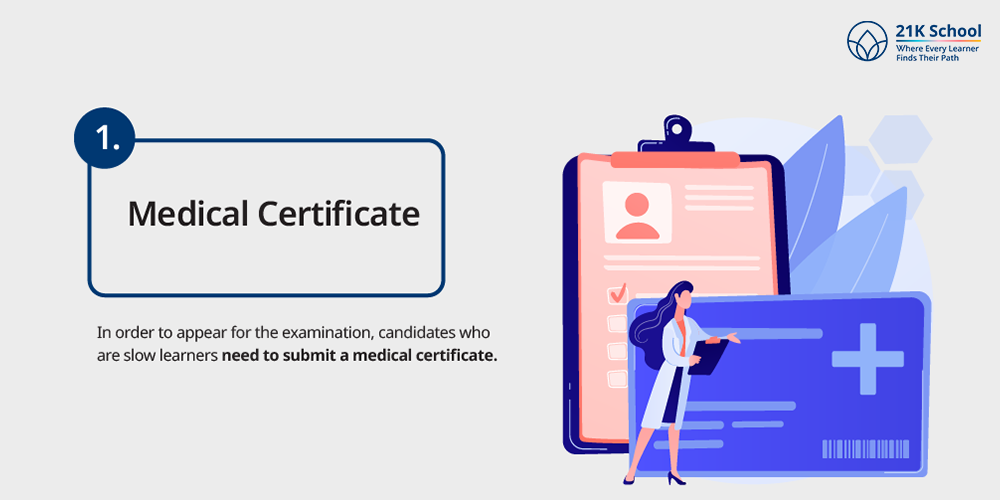
In order to appear for the examination, candidates who are slow learners need to submit a medical certificate.
This certificate is important because it shows that the student has difficulties which can help them get special treatment for their studies and tests. A medical certificate helps in describing the type of learning disability and disorders.
2. Disability Certificate
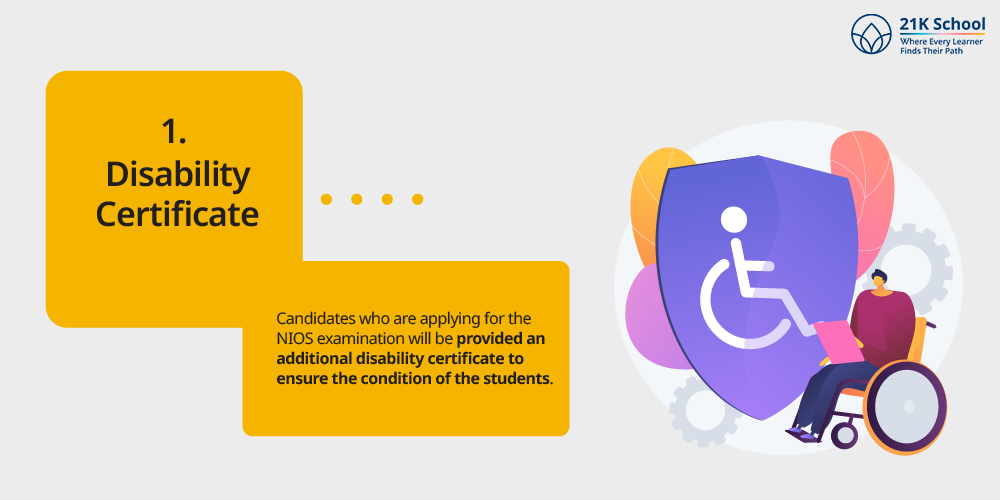
A disability certificate is another type of important certificate that is essential for students to be provided by the school.
The disability certificate helps NIOS comprehend the learners’ particular needs and ensures that the appropriate actions are taken to support their education. This provides students access to various educational benefits and support services.
3. Important Documents
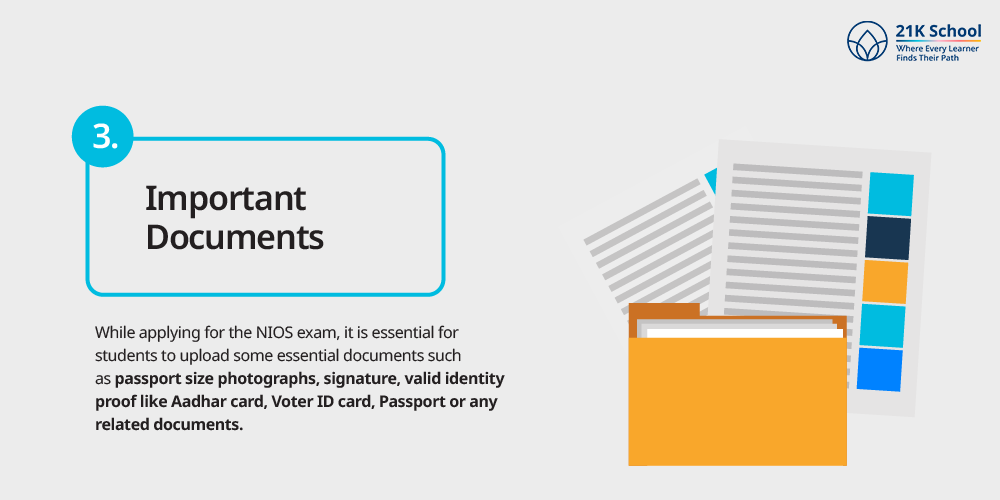
While applying for the NIOS exam, it is essential for students to upload some essential documents such as passport size photographs, signature, valid identity proof like Aadhar card, Voter ID card, Passport or any related documents.
Students must submit properly scanned documents in the correct format. These documents allow NIOS to maintain accurate records and make the enrollment process smoother and easier.
4. Age Proof
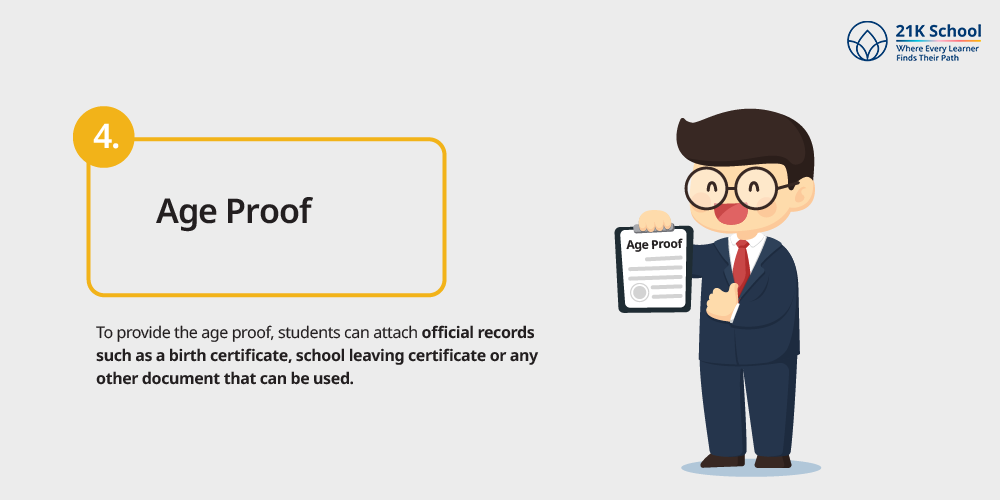
Candidates applying for NIOS enrollment must submit age verification. To provide the age proof, students can attach official records such as a birth certificate, school leaving certificate or any other document that can be used.
This is used to ensure that a student is enrolled in the appropriate grade or course of study, as age verification is required.
NIOS vs Traditional Schooling for Slow Learners
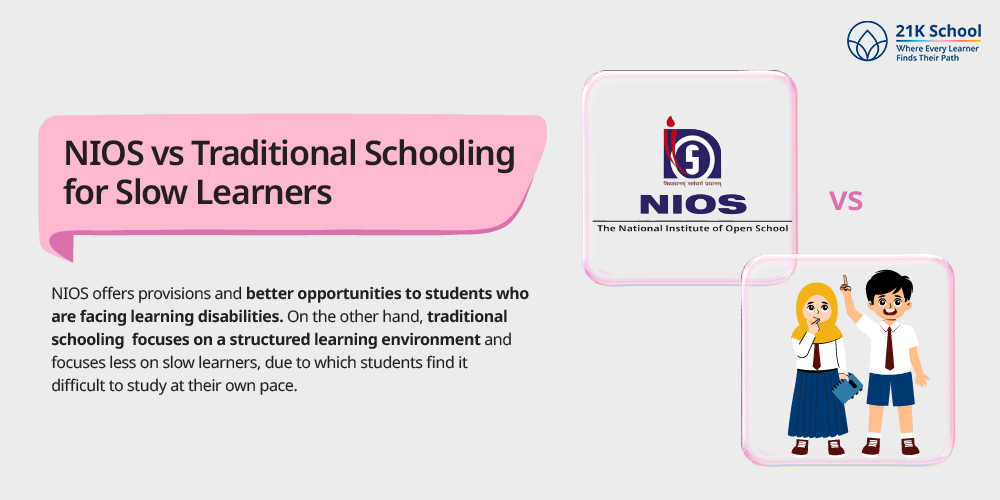
NIOS is a more flexible and comfortable approach for slow learners as compared to traditional education. NIOS offers provisions and better opportunities to students who are facing learning disabilities.
On the other hand, traditional schooling focuses on a structured learning environment and focuses less on slow learners, due to which students find it difficult to study at their own pace. Here, you can refer to the differences between NIOS and traditional schooling.
| Aspect | NIOS | Traditional Schooling |
| Learning Method | NIOS uses a flexible learning method, which allows slow learners to complete their education without barriers. | Traditional schooling uses a structured learning method, which has less flexibility, due to which slow learners find it tough to maintain the speed. |
| Affordable | NIOS is very affordable, making it accessible for everyone. The fees and course related materials are very cost-efficient as well as it cuts the travel and other related costs. | Traditional schooling is expensive, especially private schools. Students have to travel to school every day, which costs them a lot. |
| Inclusivity | NIOS provides open courses that enable children of all backgrounds to complete their education without any barriers. This promotes inclusive education in classes. | Traditional schools don’t have many open courses, which hinders students of different backgrounds from being enrolled in classes. Due to this, it limits inclusive learning environments. |
| Assessment Method | NIOS conducts assessments based on students’ preferences, such as on-demand examinations or special exams. This flexibility allows students to study as per their convenience. | Traditional schooling uses a summative assessment method that includes exams or project work. This Method conducts scheduled exams, and candidates have to appear for the exam on the same date, which does not give flexibility. |
| Attendance Method | NIOS doesn’t have any attendance policy, which makes it ideal for students to focus on their studies along with other work. | Traditional schooling has a strict attendance policy with a minimum of 75%. Due to this many students face restriction towards their academics and other skills. |
Success Stories of Slow Learners with NIOS
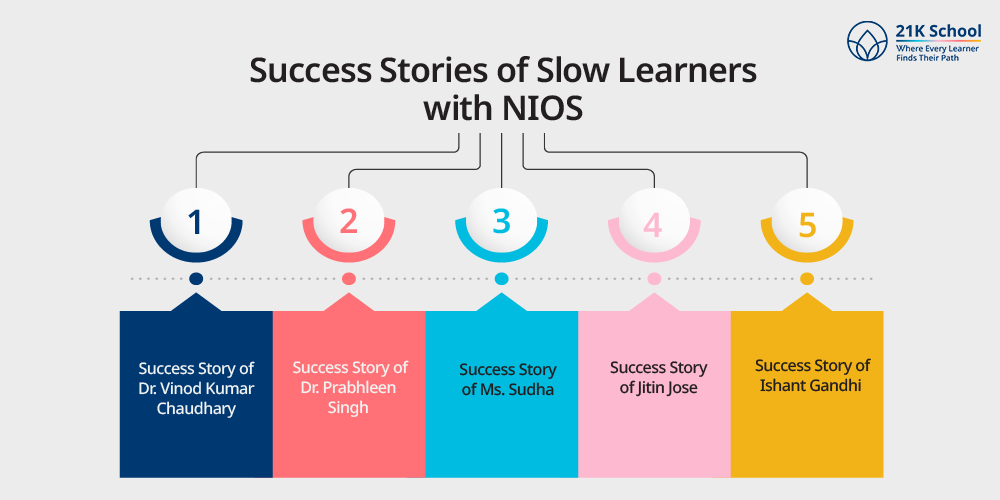
NIOS has made many dreams come true; many people who have studied through NIOS are well-established and living a good life. NIOS breaks all the stereotypes and barriers, allowing students to access quality and equal education without any hindrances.
Many individuals have shared their success stories , which motivates other students to participate in the learning process. Here are the success stories of slow learners with NIOS.
1. Success Story of Dr. Vinod Kumar Chaudhary
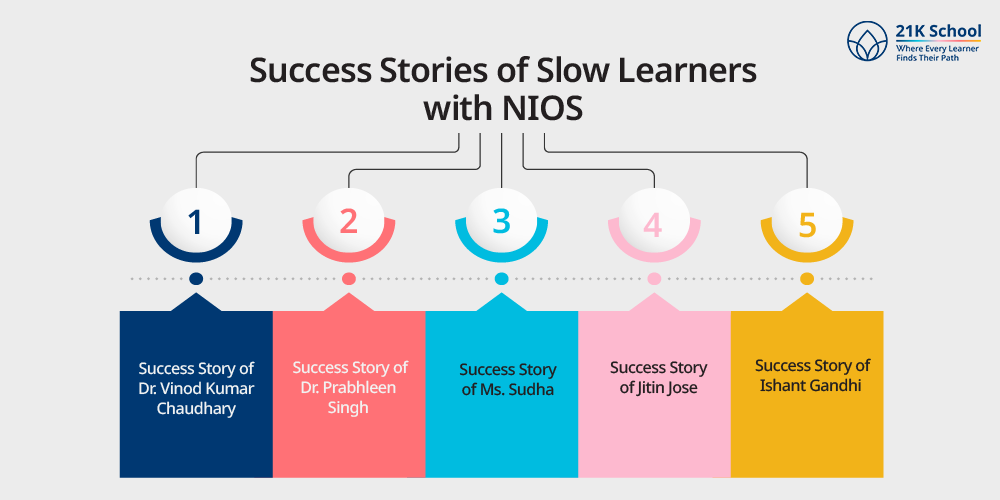
Dr. Vinod Kumar Chaudhary was a student of NIOS who completed his course in Ayurveda and Yoga. Dr. Vinod Kumar Chaudhary is currently a computer operator by profession. He has ten Guinness World Records in a variety of sports and typing-related domains.
World Record University granted him an honorary doctorate for his exceptional success in the typing field. He also gives away free typing lessons to help underprivileged students thrive in life. By providing free yoga and exercise he also motivates them to keep up their physical and mental health.
2. Success Story of Dr. Prabhleen Singh
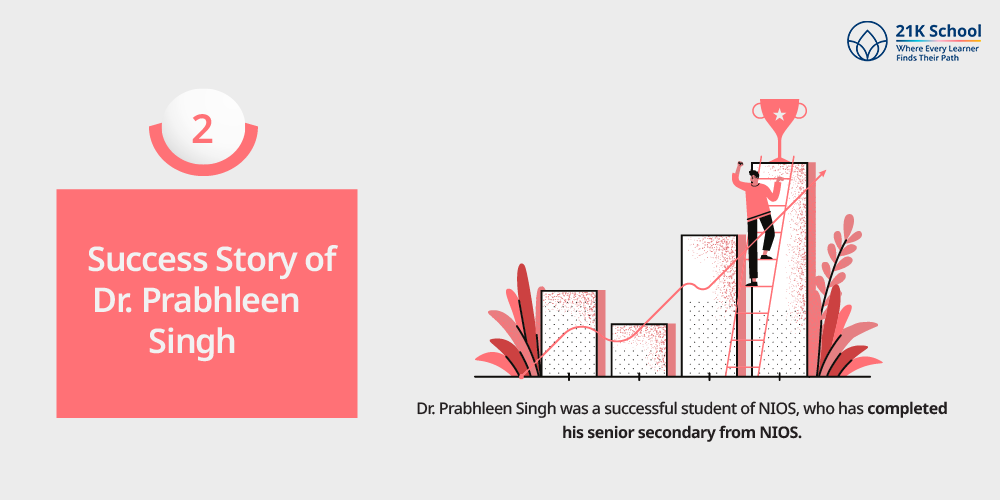
Dr. Prabhleen Singh was a successful student of NIOS, who has completed his senior secondary from NIOS. Currently, he is preparing for his MD/MS entrance examination. Prabhleen Singh was a student at Delhi Public School.
In order to have greater freedom in his academic endeavours, Prabhleen decided to enrol in the NIOS Senior Secondary program in Puram, Delhi. Furthermore, Dr. Prabhleen Singh is a published author. In 2008, his first book, “And The Mirror Kissed Back” was published by Cinnamon Teal Press in Goa.
3. Success Story of Ms. Sudha
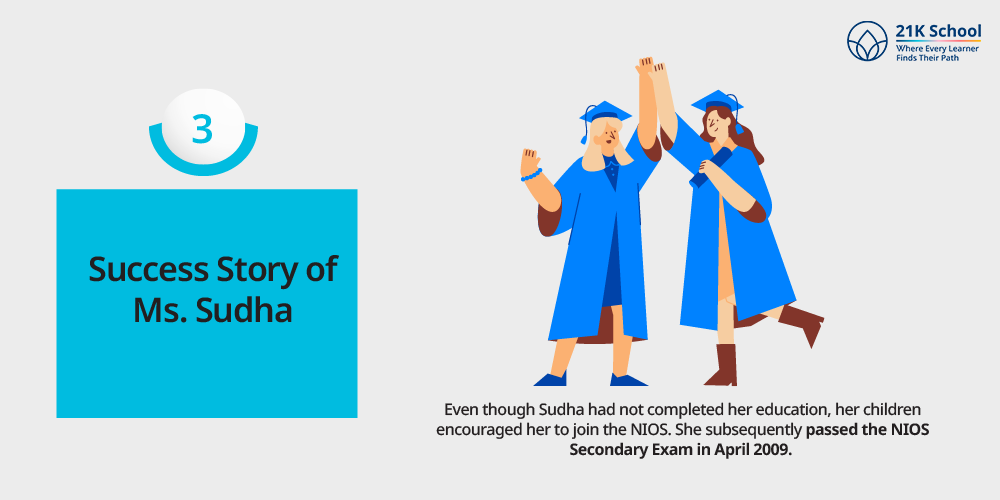
Prior to being given the chance to work after her husband passed away, Ms. Sudha was a stay-at-home mother. After her husband’s death, she was given an offer of a constable with the Delhi Police. After that, she began working to support her two kids and their families.
Even though Sudha had not completed her education, her children encouraged her to join the NIOS. She subsequently passed the NIOS Secondary Exam in April 2009. She obtained certification, which helps her to feel more confident and educated. Currently, she is working at the Rohini Court in Delhi.
4. Success Story of Jitin Jose
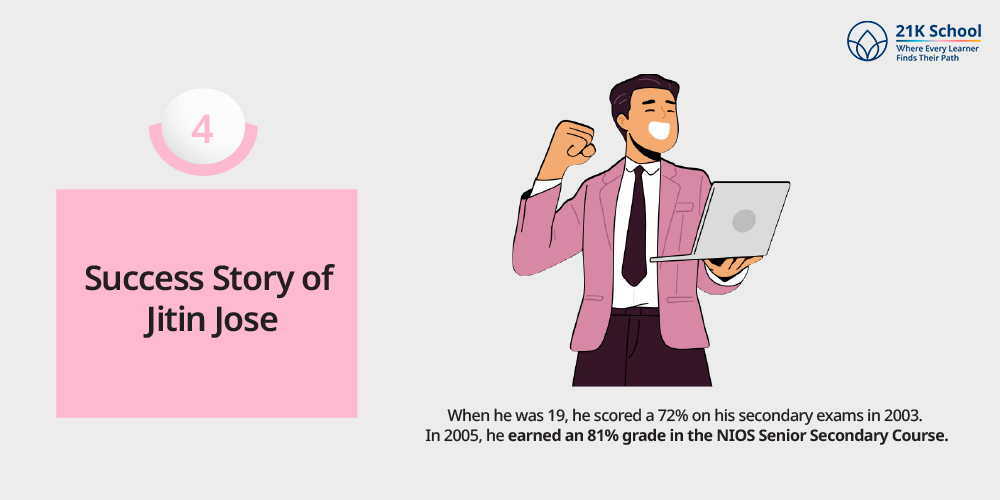
Jithin Jose had haemophilia, a disorder that stops blood from clotting as it would in a healthy person; he was forced to leave school when he was in class II.
Jitin was sixteen years old when his parents learned about NIOS. After being made aware of the NIOS, he signed up for the foundation course.
When he was 19, he scored a 72% on his secondary exams in 2003. In 2005, he earned an 81% grade in the NIOS Senior Secondary Course. Jithin Jose is currently working as a CA and he achieved a rank of 41 in the all-India level.
5. Success Story of Ishant Gandhi
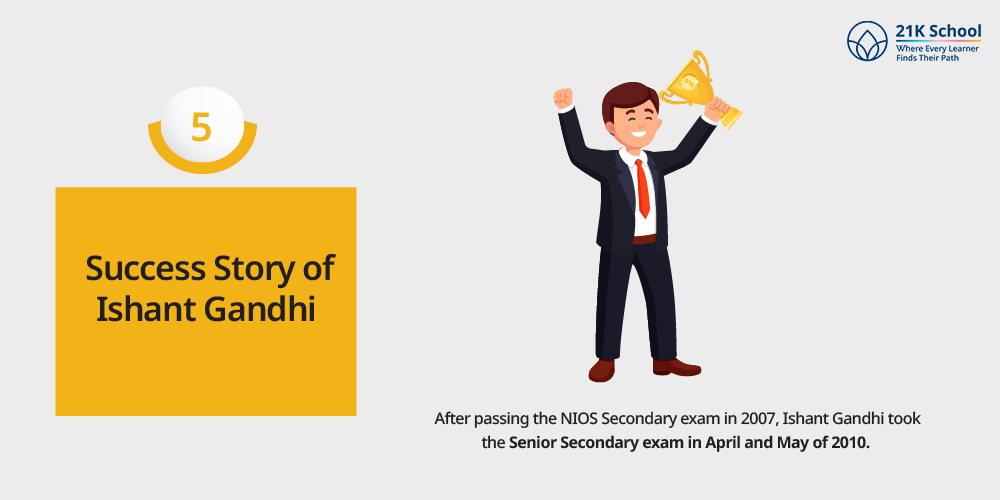
After passing the NIOS Secondary exam in 2007, Ishant Gandhi took the Senior Secondary exam in April and May of 2010. Ishant began performing acting when he was eight years old, coming from a family of artists.
He went to a regular school until class IX, but he struggled to balance his acting schedule with formal education . His enrollment and passing of the secondary exam were made possible by the NIOS, which provides the option of flexible education.
Ishant is an exceptionally talented student who performs kathak dance as well as cultural and devotional events like kirtans and bhajans.
Final Note
For slow learners, the National Institute of Open Schooling (NIOS) is a unique educational platform that offers the resources and encouragement they need to thrive in their academic endeavours.
Students with learning disabilities can overcome obstacles and accomplish their objectives in an inclusive environment created by NIOS, which provides self-paced learning, flexible subject choices, accessible study materials and specialised support services.
Slow learners benefit greatly from NIOS as demonstrated by the success stories of people like Dr. Vinod Kumar Chaudhary, Dr. Prabhleen Singh, Ms. Sudha Jitin Jose and Ishant Gandhi.
By providing individualised instruction and career training, NIOS helps students succeed academically while also boosting their self-esteem and independence, allowing them to succeed in both their personal and professional lives.

